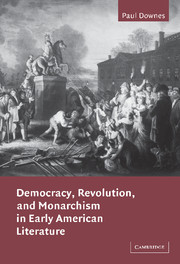Book contents
- Frontmatter
- Contents
- Preface
- Acknowledgments
- Introduction: the spell of democracy
- 1 Monarchophobia: reading the mock executions of 1776
- 2 Crèvecoeur's revolutionary loyalism
- 3 Citizen subjects: the memoirs of Stephen Burroughs and Benjamin Franklin
- 4 An epistemology of the ballot box: Brockden Brown's secrets
- 5 Luxury, effeminacy, corruption: Irving and the gender of democracy
- Afterword: the revolution's last word
- Notes
- Bibliography
- Index
4 - An epistemology of the ballot box: Brockden Brown's secrets
Published online by Cambridge University Press: 22 September 2009
- Frontmatter
- Contents
- Preface
- Acknowledgments
- Introduction: the spell of democracy
- 1 Monarchophobia: reading the mock executions of 1776
- 2 Crèvecoeur's revolutionary loyalism
- 3 Citizen subjects: the memoirs of Stephen Burroughs and Benjamin Franklin
- 4 An epistemology of the ballot box: Brockden Brown's secrets
- 5 Luxury, effeminacy, corruption: Irving and the gender of democracy
- Afterword: the revolution's last word
- Notes
- Bibliography
- Index
Summary
It is an eminent advantage incident to democracy, that … its inherent tendency is to annihilate [secrets].
(William Godwin, An Enquiry Concerning Political Justice, 531)It is said, that you are afraid of the very Windows, and have a Man planted under them to prevent Secrets and Doings from flying out.
(William Paterson to William Ellsworth, a delegate at the Constitutional Convention in Philadelphia, August 23, 1787, quoted in A Rising People)INTRODUCTION
William Godwin's antipathy towards secrets could be said to have inaugurated a long tradition of equating democracy with publicity, a tradition that has received further elaboration in recent accounts of the American Revolution. The renewed attention to a Habermasian “public sphere” and to a late-eighteenth-century civic culture of print has focused attention on the relationship between the emergence of modern political forms and a marked proliferation of unfettered political expression. The growth of a discursive space distinct from that of the State yet capable of commenting critically upon the State is said to have facilitated an opening-up of opportunities for political participation and to have contributed to an erosion of the structural secrecies of a pre-modern political world.
But Michael Warner, in his very influential study of the relationship between print culture and the American Revolution, asks an important question about the subject of the public sphere in the preface to The Letters of the Republic.
- Type
- Chapter
- Information
- Publisher: Cambridge University PressPrint publication year: 2002

